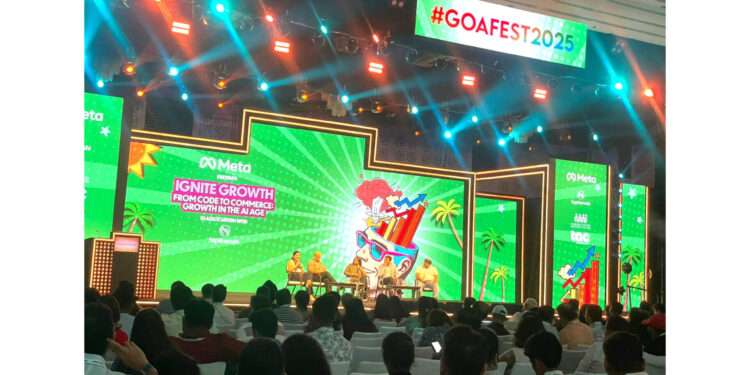In the AI age, the winners will be those who harness code not just for commerce, but for creativity, connection, and conscious innovation.
Panelists:
Arjun Choudhary, Vice President, Swiggy
Sanket Prakash Tulangekar, Director, MakeMyTrip
Tejas Apte, Head of Media and Digital Marketing, Hindustan Unilever Limited (HUL)
Pragya Bijalwan, Chief Marketing Officer, Voltas Limited
Moderator: Anuradha SenGupta, Independent Journalist & Producer
The session opened with moderator Anuradha SenGupta setting the tone by reflecting on how ChatGPT catapulted generative AI into mainstream awareness. She noted the seismic shifts AI is causing across industries, including organizational restructuring at tech giants like Microsoft—underscoring AI’s far-reaching impact on business and work.
AI as an Enabler of Consumer-Centric Innovation
Pragya Bijalwan of Voltas shared how AI is driving innovation in HVAC systems by enhancing personalization and user comfort. Through the analysis of consumer data, AI enables predictive maintenance and proactive customer service. She emphasized that AI is not just a technological tool but a humanizing force in consumer-facing products. According to her, AI will soon become function-agnostic, cutting across departments from marketing to operations. Crucially, she positioned AI as a partner in evolution—not a threat—highlighting the need for workforce reskilling rather than job displacement.
AI at Scale: From Labs to Local Stores
Tejas Apte of HUL detailed how the company has embedded AI across the value chain—from R&D and smart manufacturing to marketing execution. He highlighted tools like Shikhar, an app that supports general trade partners with inventory management and personalized marketing strategies. Generative AI, Apte explained, allows HUL to develop thousands of hyper-localized campaigns efficiently. Internal tools can now create and test creatives in minutes, drastically speeding up go-to-market strategies. Apte also stressed the importance of responsible and transparent AI use, citing HUL’s Dove “Miniatures” campaign as an example of ethical AI-driven communication.
Redefining Travel with Intelligent Assistants
From the travel tech space, Sanket Prakash Tulangekar of MakeMyTrip introduced Myra, the brand’s AI assistant that helps users with everything from hotel reviews to smart searches and itinerary planning. Powered by multi-agent orchestration, Myra addresses diverse travel queries seamlessly. Tulangekar also addressed the challenges of AI, stressing the need for ongoing evaluation of content for accuracy, bias, and appropriateness. He spoke about red-teaming efforts—systematic stress-testing of AI outputs—to ensure robustness and security.
AI as a Life Skill: Swiggy’s Internal Revolution
Arjun Choudhary of Swiggy spoke about how generative AI has reshaped internal operations. From sales co-pilots and real-time dashboards to restaurant support systems, AI is enhancing productivity across the board. He highlighted how even non-tech teams now use AI to draft PRDs, create demos, and mine deeper business insights. AI is also being leveraged for catalogue enrichment, video generation, and session-level personalization for users. Choudhary aptly summed up AI’s transformative potential by calling it a life skill—as essential as mathematics in the modern workplace.
Key Takeaways:
- AI is no longer a future tool—it’s an active driver of personalization, efficiency, and business innovation.
- Cross-functional AI integration is critical, from customer service to supply chain.
- Ethical deployment, transparency, and human oversight remain essential.
- As AI becomes democratized across roles and industries, reskilling is vital—not optional.
The panel concluded with a shared sentiment: in the AI age, the winners will be those who harness code not just for commerce, but for creativity, connection, and conscious innovation.






























